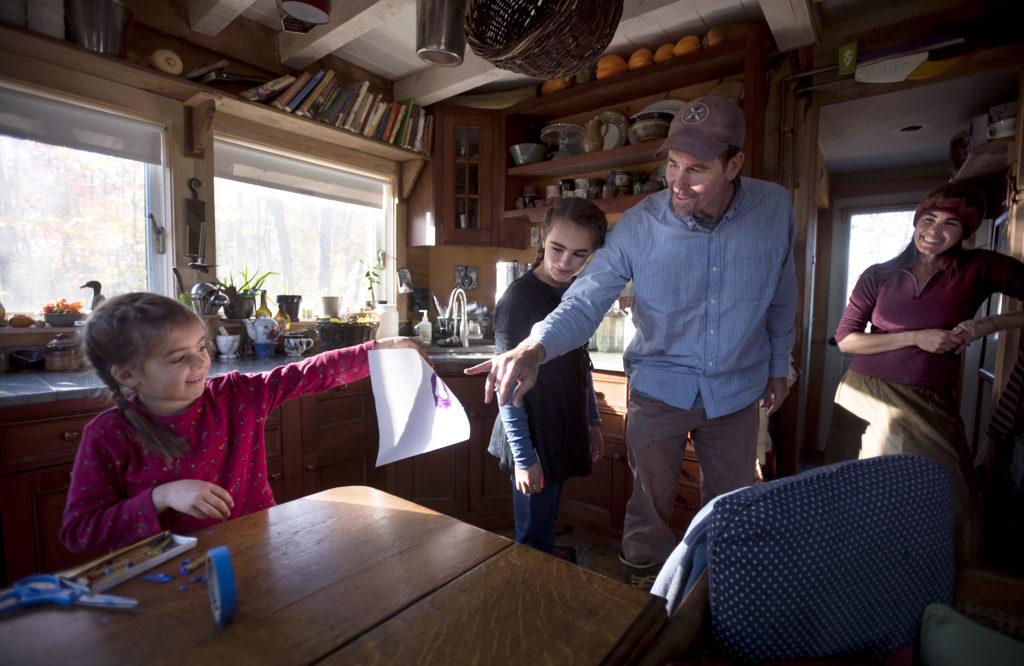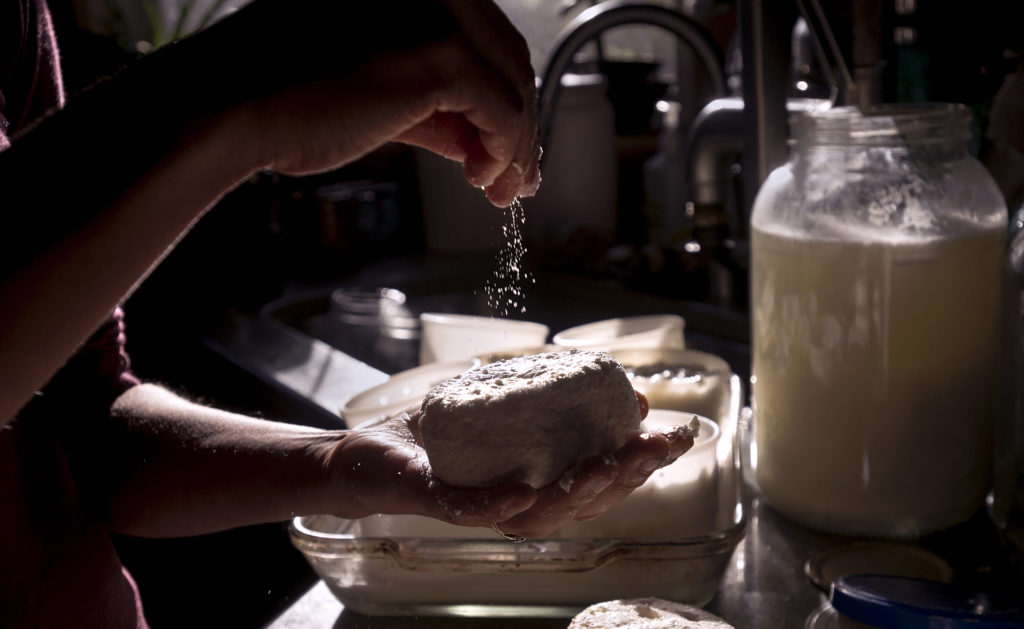Tips from Maine’s homesteaders on how to survive social distancing

Many people have struggled to cope with changes in daily life due to the global pandemic. For some homesteaders and preppers, though, it seems like they have been preparing for social distancing, self-isolation and self-quarantine for a long time.
“As a food-producer and a homesteader, I’ve had the benefit of feeling fairly secure in the midst of the coronavirus pandemic,” said Samantha Burns, homesteader at Runamuk Acres in New Portland. “My pantry is always well-stocked and I have the skills, tools, and supplies needed to be able to grow and make food to feed my family and others.”
Luckily, homesteaders are more than willing to share what they have learned from centering their lifestyles around self-sufficiency. Here are some tips from Maine’s homesteaders on how to survive social distancing — physically, mentally and emotionally.
Reframe your mindset
Though it may be challenging, try to view your time spent social distancing as an opportunity.
“Spending more time in isolation need not be a punishment. Think about the many activities that are best done in solitude: reading, writing, pottery, learning a new song on your favorite instrument,” Burns said. “This could be your chance to get back into that old hobby or take up a new one.”
Reframing your mindset is also important for tasks like grocery shopping during the coronavirus or making your food stores stretch through the period of isolation.
“Prepping is by no means a party but if you can look at your situation as an opportunity instead of a hindrance, you’ll find that [you’re] probably more creative and frugal than you ever thought you could be,” said Shane William, a homesteader based in Poland. “Trust me.”
Don’t go panic shopping
So-called “panic shopping” will lead you to buying things that you do not need or will not use.
“I was a little surprised though by the number of locals that have panicked and are hoarding weird stuff like toilet paper, flavored soda, meats [and] fresh vegetables — yet no fruits?” William said. “A seeming majority are going for short shelf-life and junk food items instead of being rational and preparing for the possible long term.”
Before you go to the grocery store, make a list of the items you do not have yet in your pantry that may be useful. William said to focus on items like nuts, rice, flour, vinegar, sugar, salt, yeast, baking soda, oil, canned, pickled and dried goods — and, of course, coffee and alcohol, if those are among your vices.
Another shopping tip: don’t buy something you won’t use just because everyone else is buying it.
“[The] best [advice is] ‘store what you use, use what you store’ [which] goes for everyone,” said JJ Starwalker, a homesteader based in East Corinth. “If you don’t eat it in good times, you will be much less likely to eat it in hard times. Under stress, folks want the familiar and comfortable.”
Purchase, trade or barter from others — at a distance
If you do not have all the supplies you need, consider bartering, trading or sharing with neighbors who might.
“You do not even need to grow your own food [and] homestead to can and be prepared,” said Wendy Smith, a homesteader in Carmel. “Purchase from others! Also, you can trade with people. This is very helpful for both parties.
If you are meeting up with a friend or neighbor to barter, make sure you stay the requisite six feet apart while doing so. Making front porch drop-offs and exchanges is another way to trade while maintaining social distance.
“I make goat milk soap and since I do not have chickens right now a friend in my town contacted me about trading,” Smith said. “The trade of soap for eggs was perfect because she left the eggs on my porch. No contact needed!”

Learn self-sufficiency skills
Spend your social distancing time developing new skills — especially ones that will help you get through this moment in time, or develop self-sufficiency for the future.
“I think this is a good time to practice DIY skills like baking, cooking, gardening, household projects and wood-craftsmanship, which all increase our self-sufficiency so that when things like this happen, we are not so ill-equipped to deal with it,” Burns said.
If you don’t often cook from scratch, spend a little more time experimenting in your kitchen.
“I would probably recommend expanding cooking skills to cover baking bread and making bean dishes,” said Catherine Ednie, a homesteader based in Hancock. “Cooking from scratch in general is a huge step forward.”
Canning is another skill that is fun and easy to develop if you have more time than usual in proximity to your home kitchen.
“I think canning is an easy thing to learn during a time like this,” said Piper Dean, homesteader in Walpole. “Most things can still be ordered online. YouTube is one of the best free learning places around.”
You can also focus on developing skills that will help you to replace goods that are unavailable at the store.
“Work on a few skills so that if it is required to stay at home and if certain goods are unavailable, people can develop a confidence that they can feed their families in ways they are not accustomed to,” Smith said.
Robin Follette, a homesteader in Talmadge, said not to worry if your home experiments don’t turn out quite like you planned.
“If you make a mistake while knitting you pull it out and start again,” she said. “It’s okay if seeds don’t germinate. It’s okay if the bread is a brick. We always learn something when we try. If it turns out beautifully you’ve learned something new you might continue to do, or not do again, until the next crisis.”
Spend time with family outdoors
Spending time with family will help reduce stress — especially outdoors. You can use the outdoors as an educational tool for your children who are stuck at home for the foreseeable future. You can even teach them a few skills of their own.
“My suggestion would be to continue to spend time with your family,” said Kara Morrison, a homesteader based in Augusta. “Teach your children how to raise animals, hunt, fish and grow fruits and veggies, how to start fires and build things.”
Start gardening
Aside from the self-sufficiency benefits of growing your own food, gardening can provide perhaps much-needed stress relief.
“Gardening is quite therapeutic,” Smith said. “Enjoy the pleasure of being outside, of learning, of watching the progress and of eating, even if you do not have extra to put away.”
First-time gardeners can take a few steps to start gardening during the pandemic. Even if you are stuck at home, now is a great time to start preparing.
“I believe even just the planning will be a welcome distraction and alleviate anxiety,” Smith said. “I suggest you start small. It can be one container of tomatoes. Choose easy to grow veggies that you like eating and that you would enjoy working with.”
Reaching out to experienced gardeners over the phone or online will also give you the opportunity to connect, even from a distance.
“Ask questions of experienced gardeners,” Smith said. “There is not a season I do not call my dad many times and ask him things.”
Use what you have
Using what you have is a big part of the homestead mentality. Even if stores are out of cleaning supplies, you can use what you have to create makeshift cleaners.
“Baking soda is good for so many things: cleaning, bread, laundry, brushing teeth,” Smith said.
The use-what-you-have mentality also goes for cooking. There are easy substitutions for common ingredients — right in your kitchen.
“I have been surprised at how hard some of those ingredients are to come by now,” said Stephanie Buehler Johnston, a homesteader based in Newburgh. “I’m getting more creative with some new recipes if I’m out of something. I made muffins the other day but had no sugar, so we used some of the maple syrup we’ve just finished making as the sweetener.”
“Be resourceful,” Smith said. “There are recipes for bread that do not require yeast.”
And, yes, this goes for toilet paper.
“Stop worrying about toilet paper,” William said. “There is a long history of efficient alternative ways to [cleanse] yourself before [toilet paper] was even invented.”
